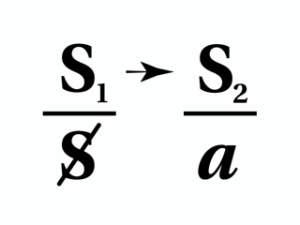What is S1 w/in the four discourses?
THE SYMBOLS:
To understand Lacan’s four discourses I think it is useful to have an idea of what the four symbols he will use in all four of the discourses mean. However, providing a key of this sort is not easy. The main reason that it is difficult is because Lacan uses the symbols as shortcuts to describe very difficult concepts and provided no “this symbol means exactly this thing” matrix.
Thus, I want to make it as clear as I can, that what I’m providing you with here is a key I’ve made to help myself understand the discourses. I’m not giving you Lacan’s ideas! I am giving you my attempt to make sense of Lacan’s ideas. (I also want to point out that lots of other people who are smarter than me have written about the four discourses. If you find the four discourses interesting, do some digging into what else is out there to help you make sense of them.)
The four symbols are S1, S2, $, and a. I will not dive into all four today, but I will dive into the S1 and touch on S2. Next week I’ll work through one of the remaining symbols.

S1:
S1 = The master signifier. So what’s the master signifier? The master signifier is something within a system of meaning that holds the whole system together. If a system does not have an S1 to serve the role of master signification, there will be no system, there will only be a chaotic collection of stuff that’s all out of order.
A master signifier is a person, place, or thing (concept, idea, symbol, etc.) that all power and authority in a system originates from. In many religious systems, the master signifier is God. In a legal system, the master signifier is the law.
One thing that makes S1 so interesting is that it is an “empty signifier.” However, something being both powerful and simultaneously empty is difficult to grasp at first, so let’s inspect that contradiction.
Let’s use “the law” as our example of S1 (master signifier).
- The subjects of the law create and maintain the law. Ergo, the subjects create the thing (the law) that is their master.
- The law does not have physical substance, does not have agency. The law is a tool but a tool without form. Be that as it may, a majority of people believe the law is powerful, and therefore act as if the law was some physically present entity that can force them to live their lives in accordance with social norms and rules.
- In effect, subjects create a powerless idea (the law) then somehow agree that everyone will act as if this powerless thing was a powerful master. But the reality is that the law does not really exist, it is empty! The law only exists in so far as people believe it exists, in so far as people fill it up with their own authority and agency.
One clue that something is an S1 is that different people who show a strong belief in S1 will have different interpretations of S1’s desires and demands. This is one reason different legal scholars will have different ways of interpreting the functions and intentions of the law. If the S1 that is the law were not empty, the legal scholars could not fill it with different ideas about how the law works.
We can see the same thing happen with the S1 of scripture in the various religions of the world. Different religious scholars will come up with very different ideas about what the scripture is saying. This happens in Judaism, Islam, and Christianity because the scripture is actually an empty signifier that can be the master that the subject desires the scripture to be.
One last specific real-world example: I believe one of the best examples of S1 is the Monarchy of the United Kingdom. (This is on my mind a lot because I’m watching season three of The Crown.) The monarch is the sovereign in the UK, the person with the “authority” to decide and make stuff happen. For example, after an election, a Prime Minister goes to the monarch and asks for permission to form a government. However, the government has already been constituted via the election and asking the sovereign to grant the government authority is just a formality.
So why does the UK have a monarch as sovereign? Because the system requires that one person have that authority. The beauty of the UK’s system is that in all actuality the monarch does not have any real power, but everyone just agrees to pretend that he/she does because that makes things function smoothly. It’s such a good real-life example of S1 as a master signifier empty of power but everyone acts as if it were full of power. The effect is an illusion that most people are happy with because it makes their lives stable and predictable.
Ok… I hope that helps make sense of S1. Let me know if it did or didn’t.